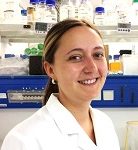
IL-9-producing pathogenic versus non-pathogenic Innate Lymphoid Cells in fibrotic diseases
Fibrotic diseases impose a major socioeconomic burden on modern societies and account for up to 45% of deaths in the developed world. Despite the great medical need, anti-fibrotic therapies are not yet available for clinical use. Fibrotic diseases can affect virtually every organ system. They can be restricted to single organs, as in idiopathic pulmonary fibrosis (IPF), or may affect multiple organs, as in systemic sclerosis (SSc). SSc is a prototypic multisystem fibrotic disorder that disrupts the physiological architecture of affected tissue by an excessive accumulation of extracellular matrix. The current concept of the pathogenesis of multisystem fibrotic diseases postulates a triad of inflammation attributed to humoral and cellular immune abnormalities, vasculopathy and fibrosis. However, the mechanisms in this fundamentally important process of tissue injury are incompletely understood. A growing body of evidence suggests that overproduction of extracellular matrix components results from complex interactions between various cells, including leukocytes and fibroblasts. More recently, locally accumulating innate-like lymphoid cells (ILCs) are emerging as an important cellular source of cytokines triggering fibrotic tissue remodeling independently of the adaptive immune system. Therefore, we aim to further characterize ILCs and to validate ILC2s as therapeutic target in fibrotic diseases.




Publications
Rauber S, … Distler JH, Ramming A. 2017. Resolution of inflammation by interleukin-9-producing type 2 innate lymphoid cells. Nat Med. 23:938-44.
Vély F, …Distler JH, Ramming A, …Vivier E. 2016. Evidence of innate lymphoid cell redundancy in humans. Nat Immunol. 17:1291-9.
Wohlfahrt T, … Distler JH, Ramming A. 2016. Type 2 innate lymphoid cells counts are increased in patients with systemic sclerosis and correlate with the extent of fibrosis. Ann Rheum Dis. 75:623-6.